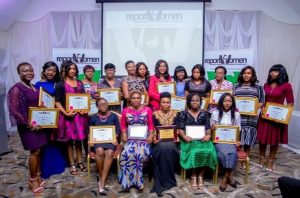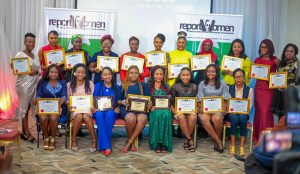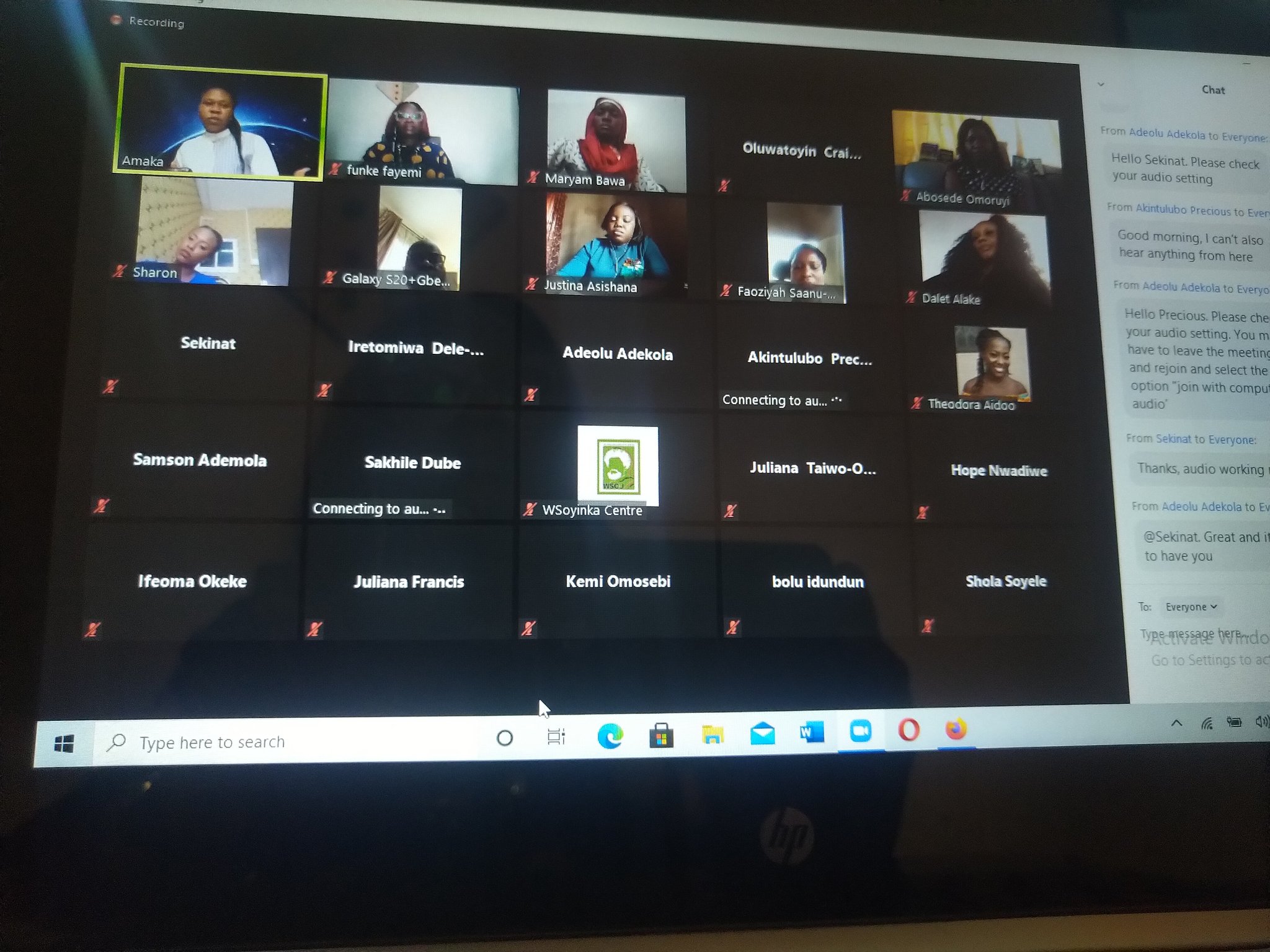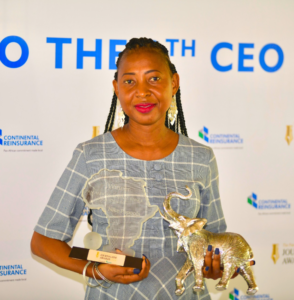Lekan Otufodunrin, Executive Director of Media Career Development Network reports on a major issue of discussion at the webinar held by the #ReportWomenNetwork of the Wole Soyinka Centre for Investigative Journalism (WSCIJ) to mark International Women’s Day 2021.
In her contribution to the webinar held by the #ReportWomenNetwork of the Wole Soyinka Centre for Investigative Journalism (WSCIJ) to mark the International Women’s Day 2021, on Monday, March 15 the State Correspondent of The Nation in Niger State Justina Asishana noted that there are two main glass ceilings women journalists have to contend with to reach the peak of their careers.
The #ReportWomenNetwork is made up of fellows of the 2017, 2018 and 2019 Female Leadership Programme of the WSCIJ.
According to Asishana, the two are the ones imposed on them by themselves and the other by the society and the industry they work.
The one they imposed on themselves according to her, has to do with accepting that they don’t have the capacity to measure up like their male counterparts. Not trying enough as they should and even giving gender excuses to avoid tough tasks.
Even when they have higher qualifications and experience, the women in this category have adopted the default position that they can’t make it to the top and are easily contented with whatever role they are given.

For the one imposed by society and the industry, women are expected to play the second fiddle and not try to compete with men for positions. Women should cover the soft beats and not take on major assignments even when there have been women Publishers, Chairpersons, Editor-in-Chief, Chief Executive Officers and more.
When some women journalists demand equity based on their qualifications and competence, they are called all kinds of names and only the strong-hearted who are able to ward off any intimidation or harassments insist on their rights.
Asishana, a World Health Organisation (WHO)/ International Centre for Journalists (ICFJ) Safety Fellow believes that If only women are able to break the glass ceilings they impose on themselves, it would be easier to break the one the society imposed on them.
Apart from these two, there is a third one which Adesola Ayo-Adenrele, Editor @punchhealthwise noted in her tweets. It is the one imposed by successful female journalists on the upcoming ones which she says is the worst.
“It’s quite common, especially among those who achieved professional recognitions through mentoring. They sometimes find it hard to pay it forward, so that no one will match their record. It’s the reason many young women look up to men for mentoring. We can do better,” Ayo-Adenrele, Knight Fellow, Standford stated.
READ ALSO: FROM KANKARA- JENGEBE: MY MOTIVATION FOR FRONTLINE REPORTING
This third one can be a tough nut to crack for younger female journalists who need role models and willing mentors of their gender who knows what it takes to be a woman.
The solutions to this will require that accomplished female journalists know they owe a duty to support the younger ones. As the Chief Executive Officer and Executive Director of WSCIJ would put it, they have to be very intentional about helping those coming behind them.
If men who are the majority in the leadership of media organisations are not as willing as they should develop gender policies for their media houses to address the complaints by female journalists, Theodora Aidoo from Ghana puts its bluntly that the few women in top positions should show the way.
“They should not wait for anyone to draft the policies. They should draft and implement policies that would make the job easier for the next generation of female journalists in your own capacity,” she stated.

Shattering the glass ceiling would not come easy, says Ashishana who noted that there is a need to aim beyond the limitations. Her suggestions on what women should do include the following:
- Creation of female network communities/forum – only a few media organization have focus Programmes for female globally, in Nigeria, few media organizations like the WSCIJ (FRLP and REWON), Code for Africa (WanaData), AWIM and Paged Initiative offer Programmes that focus on the development and empowerment of female Journalists.
- Women need to be able to break the glass ceiling they have imposed on themselves.
- Attitudinal change: The path to a leadership position will continue the way it is now until the women change their attitude to work.
- Be hardworking – for women to aim beyond the glass ceiling, they must be hardworking. Take on tasks assigned to them and stop giving unnecessary excuses.
- Be open for mentorship/mentoring – most women who have shattered the glass ceiling are not ready to mentor others and most women are not interested in being mentored.
- Find a balance between being a wife, mother and journalist – this requires delegation of duties.
- Speak out but don’t be arrogant or rude
- Women need to support each other
To provide a conducive work environment and overcome social norms, Ashishana recommended the following:
There is a call for female Journalists networking communities or forum that is not politically motivated or for selfish gains but to train, motivate and mentor women journalists to mitigate the risks associated with journalism, give them mentoring and help them believe in their skills and capabilities. These groups will give the training to help female journalist have better chances of advancement, to help them rise through the rank. Female Journalists need these fora to share their views with fellow female Journalists to enable them to handle situations which if on their own may leave them intimidated, abused and coerced. There is strength in number and a crowd is louder than a single voice.
- Maternity policies and friendly family practices should be implemented in media organizations.
- Women should be given the opportunity to prove their abilities by being assigned to desks that may be seen as male-only.
- The mechanism should be put in place to check the harassment and bullying of female journalists.
- Women should empower themselves and not wait for handouts from their bosses. I have learnt how to say No! I look out for online opportunities.
- For women journalists, an awareness of cultural norms and practices is particularly They should respect the local dress code and err on the conservative side. It is often a good idea to take a scarf, which can be used for many things but is particularly useful in Muslim countries as a head covering. A journalist should be aware of how her contacts and sources might perceive her and avoid courting cultural misconceptions. Journalists must ensure they are well-prepared to understand and mitigate the risks they may face in the course of their work.
- Female journalists should make it clear they will not tolerate inappropriate touching or comments from support staff, colleagues and sources.
-

2019 Fellows
Women to take ownership of their own development and empowerment
In our very patriarchal society, being a woman is indeed tough and this is reflected in what women journalists have to contend with. For those who have been able to overcome the challenges and prove their mettle and those still striving to be one, the quote below is for them:
“Here is to strong women, especially in the media. May we know them. May we be them. May we raise them” – UNKNOWN
Report Women Network advocates equitable reporting and female leadership in the media.
To learn more about its activities follow at @ReportWomen #ReportWomen www.wscij.org






